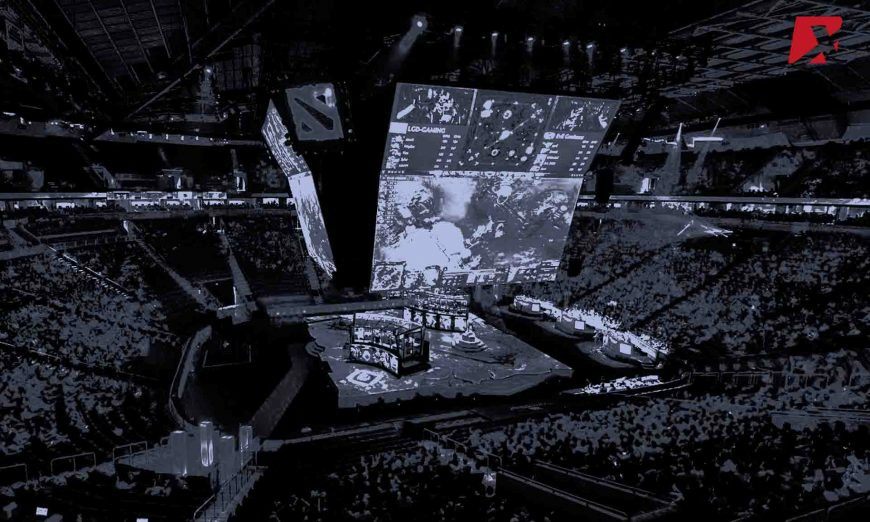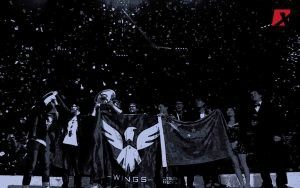
As of the time of writing, the prize pool is a couple of bucks shy from reaching $20 million. If many are wondering how the amount came to be, the simple reason is that fans of the game are chipping in money by purchasing the game’s Battlepass.
It’s a direct reflection of how massive the community is, and how much they are willing to spend to support the eSport.

But it is nearly impossible to rid the community of others who are driven by malicious motives, and who could advertently destroy the beautiful scene that the Dota 2 community is building.
If Dota 2 allows, blockchain technology could get rid of many of those looming threats.
“The International”
90 professional players. 16 nationalities. 6 geographical regions. That’s how massive the event is. The tournament has consistently been organized by Valve, the publisher of the said eSport since its first year. This time, the competition will be held at the Rogers Arena in Vancouver, British Columbia from August 20-25.
With a prize pool of $19,985, 298 and growing, no one can simply ignore the ever-increasing popularity of the game. The movement is so massive that many reputable media organizations like CNN, BBC, ESPN, and Forbes took notice of it.
Currently, Dota 2 is the top eSport in the world in terms of total prize pool, followed by Counter-Strike: Global Offensive. The former has awarded about $144 million in a span of eight years, while the latter $57 million.

Currently, the eighth iteration of The International resembles the previous year’s in terms of prize pool, even though the final tally will be recorded in August. Last year, Europe’s Team Liquid bagged over $10 million and was declared champion of the said tournament. They will once again join the competition this August.
Unfortunately, their predecessor, Wings Gaming, will not. As a matter of fact, they weren’t even in attendance last year.
Wings’ Controversy
Wings Gaming, a Chinese team, was the champions of the sixth installment of The International. An underdog coming from virtually nowhere, the team secured a whopping $9 million and received immaculate renown since their historic win.
The future was bright for the team, or so it seemed.

Before the Kiev Major in April 2017 — another prominent Dota 2 event — the said team changed its name to Team Random. When asked for an explanation, the team’s representative said that the players had already left the team to form their own.
It was later revealed that the players had not been receiving their pay for over three months. Not only that, but the players also had a 30% cut from their TI winnings. And under the Chinese labor laws, this was sufficient grounds for them to consider their contracts dissolved.
Things escalated very quickly, and ACE, a Chinese regulatory organization that governs the professional Dota 2 scene in the country, forbade the former Wings members from joining any team under their influence. Many assumed the ban was permanent, but the organization later clarified that it was only temporary. However, the damage has been done, and two members left ACE to join EHOME, a professional Dota 2 organization which also withdrew from the association.
Wings Gaming is the only TI winner that exists no more. All the rest, save for Na’Vi and Alliance, who won TI1 and TI3 respectively, will be back to vie for the trophy once more.
Secretly Misusing Player Winnings
This is not the only time that a mainstream team was accused of a similar issue. In 2016, Jacky “EternaLEnVy” Mao said that Team Secret, his former organization, was taking a 10-percent cut of their winnings, which was never agreed upon prior to their signing up for the team. This is on top of the delayed and irregular payments that he was receiving.
According to Mao, they were promised a regular salary exclusive from their tournament winnings despite them not having a formal contract. However, the payments that he had been receiving were anything but “regular.” In an invoice, he found out that the organization had secretly been taking 10 percent from their winnings despite the verbal agreement that it wouldn’t.
Mao’s former teammates also echoed a similar sentiment. Rasmus “MiSeRy” Filipsen published his experience on his Medium account, saying that he had already been receiving multiple salaries from Digital Chaos, his team at that time, “when I got my first payment from [Team] Secret.” That was more than a year and a half later since he was kicked from the team. Aliwi “w33” Omar, who was one of the team’s aces in 2015, also encountered the same fate despite his stellar performance. Filipsen said that he even had “to harass and be stubborn about [his] share of the winnings” just to be paid.
322
Almost every eSports fan knows about 322. And they all know that it started in Dota 2.
Back in 2013, Alexei “Solo” Berezin received a one-year ban from the StarLadder organization for betting on his opponent team, zRage, prior to their match. Berezin, who was playing for Rox.KIS at the time, was found to have staked $100 on zRage, and won $322 as result of his team’s lost, although he did not receive the money. Even though his “throwing” was not obvious, but Berezin “sold” his team to his opponents..
Since then, every eSports enthusiast, be he a player or a commentator, would comment “322” whenever a misplay is witnessed, in remembrance of Berezin and his bet.
Upholding Dota’s Reputation
These are just some of the issues that the community has been facing since its start. But if the time comes that things get out of hand, one can only guess how the game’s reputation will go down.
That can be prevented. How? Blockchain.
According to a CoinCentral article, blockchain is capable of improving eSports betting. “The tech creates a trustless, secure ecosystem for low fee betting outside the control of a central party,” the article read.
Forbes agrees, and explains further on the benefits:
“Gamers are subject to fraudulent behavior like “chargebacks,” where an online gaming troll donates money to a gamer, but then takes that money back later on down the road. Most disputes between gamers are unfair, as gamers almost always lose or are “booted” off the servers or from the game itself.”
Furthermore, players usually get delayed compensation due to the complex and rigorous nature of traditional payouts. This can be prevented through blockchain. Also, the fate that Mao, Filipsen, Omar, could be a thing of the past; Wings’ players’ talents could not have gone to waste as well.
Talented players also find it difficult to get noticed by scouts, unless he has already gained a considerable following.
But with blockchain technology, developers could come up with a “database of professional bodies with accurate gamer profiles, statistics, and rankings.” This will help individuals with great caliber get the attention that their skills deserve, and thus help teams decide how compatible each player is with their captain, their playstyle, and with many more crucial factors.
Other platforms are already integrating blockchain and cryptocurrency into their systems, albeit on a smaller scale. FirstBlood, an eSports platform, uses the said technology in compensating players who compete against others on a ladder for in-game rewards. Those who win the match will walk away with the losing team’s tokens, and who, in turn, could trade it to items that possess real monetary value. Valve, the publisher of Dota 2, could definitely explore further into blockchain and unlock its technology to bettering not only the game, but the entire eSports community as well.

Dota 2 maintains its position as the top eSports in the world in terms of prize money given to players, as they should. Nowadays, people love an eSports championship match just as they would an NBA finals or the FIFA World Cup. However, many others are catching up fast, especially Fortnite, which will be offering a $100-million prize pool for its many tournaments from this year until 2019. Counter-Strike: Global Offensive, also a game published by Valve, has more tournaments than Dota 2, and might even surpass its predecessor in terms of prize pool offered in the coming years.
And if the eSports community doesn’t make good use of blockchain technology, it’s only a matter of time before many more will suffer delayed compensation, fraud, and thievery in the future.








